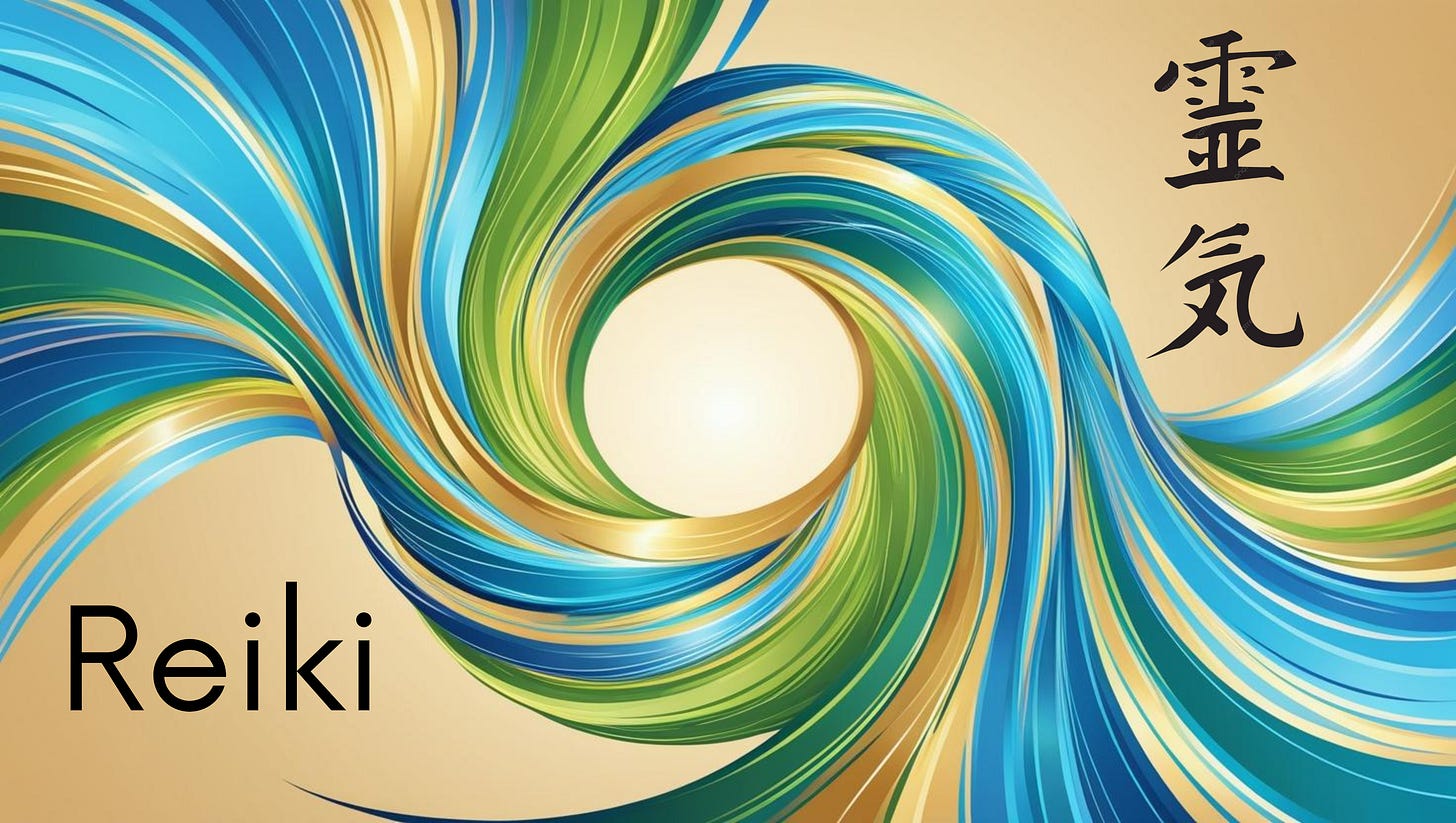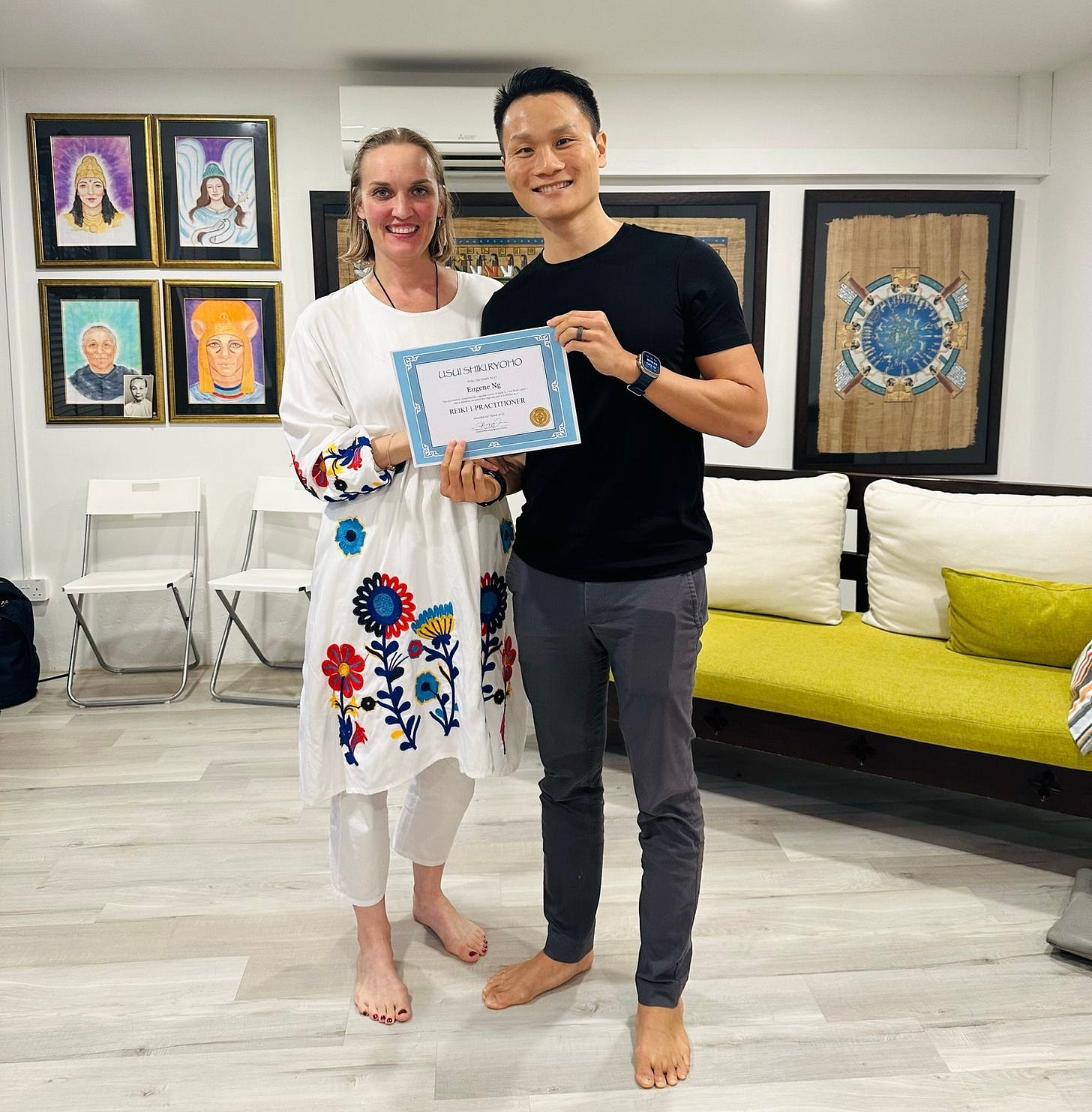Connecting the Dots: Parallels Between Reiki, Investing, and Life
Unveiling the energy flow that brings alignment to our inner and outer balance.
Reiki (霊気) was rediscovered in Japan at the end of the 19th century by Mikao Usui (1865-1926). “Rei” (霊) means universal, and “Ki” (気) means life energy.
Reiki is learning to channel the universal energy that flows through all living things to promote healing and balance in oneself and others.
Reiki emerged as a holistic approach to wellness that differs significantly from Western medicine's predominant focus on treating symptoms. Instead, Reiki emphasizes energy flow, balance, and the body's innate ability to heal itself when properly aligned. As we explore these concepts, we find surprising applicability to financial markets.
As I did my Reiki Level 1 training this weekend (deeply inspired by my wife), two grand themes became apparent to me. These two themes and other sub-themes presented many parallels to investing, business, and life.
The first grand theme is recognizing that we are merely vessels who channel energy from around us through us rather than being able to control and create.
The second grand theme is that balance is not a fixed destination. Balance is a dynamic equilibrium that is continuous and interconnected. Balance has to be pursued so that it can ensue. One should not seek balance as a destination or goal but as a continuing process.
For those skeptical about connecting an ancient energy practice with modern financial principles, I invite you to consider these parallels with an open mind. The wisdom embedded in Reiki's approach to energy flows offers surprisingly practical insights for navigating today's complex market environments.
The concept of "channeling energy" in Reiki offers numerous illuminating parallels to business, investing, and life. Below is the list of 14 that were most revelatory to me.
PS: These are merely my reflections from an observer and a novice practitioner, and we would love to expound on this further as we learn through more advanced levels.
1 | Acting as a conduit, not a controller.
Reiki: Practitioners do not create energy but intuitively channel the universal energy around them to themselves and others. They remove blockages and direct the flow of energy rather than forcing outcomes.
Investing: Long-term investors do not try to control the markets but position themselves as conduits for the existing energy of the markets. They align with secular trends and market flows rather than fighting them, recognizing that they are stewards of capital.
2 | Trusting the intelligence of the energy
Reiki: Practitioners trust that the energy knows where to go and how to help beyond their conscious understanding.
Investing: While the stock markets are often noisy voting machines in the short term, they are weighing machines over the long term. Markets have an inherent sensible intelligence through collective action that exceeds individual understanding, which has to be respected. Panic selling during market downturns often leads to missed recoveries.
3 | Directing energy to areas of need
Reiki: Practitioners intuitively direct energy to areas of imbalance or blockage in themselves or another recipient.
Investing: Smart investors direct capital to long-term opportunities that present attractive, significant, growth, and profitable opportunities that might not be widely recognized or evident. Natural market forces will always dynamically move capital from less to more attractive opportunities over the long term.
4 | Clear channels lead to better flow
Reiki: Practitioners should keep their energy channels clear and chakras in balance through regular self-practice.
Investing: Investors must have clear decision-making channels free from cognitive biases, emotional reactions, and information overload.
5 | Being present without attachment
Reiki: Practitioners remain present and intentional without any attachment to specific outcomes.
Investing: The best investors maintain awareness without emotional attachment to positions, allowing them to adjust when conditions change rather than clinging to hoped-for outcomes. It is about having strong convictions loosely held and being willing to change their minds when the facts change.
6 | Balance as dynamic equilibrium
Reiki: Chakras are not meant to remain in perfect static balance. They naturally fluctuate as we experience life’s ups and downs. Regular Reiki sessions help maintain a dynamic equilibrium for the unbalanced or blocked chakras, allowing energy to flow through all centers.
Investing: Businesses too seldom rise in a straight line. They inevitably experience ups and downs, which causes market expectations to overshoot whenever that happens. Capital allocation for investors is a continuous thought exercise in evaluating and optimizing returns versus risks and tradeoffs. Frequently, businesses undergoing shorter-term weaknesses that might not be structural (contrary to what markets might be pricing in) may experience significant price declines, causing their overall portfolio allocations to become smaller. When that happens, allocating more capital could often present attractive asymmetric returns when they recover.
7 | External influences constantly create imbalances
Reiki: Daily stressors, emotional experiences, and physical challenges constantly affect chakra balance.
Investing: Economic news, market volatility, and expectation shifts can move stock market prices dramatically higher or lower in the short term. That results in a highly dynamic process whereby the portfolio allocations are constantly in flux. Rather than continually trying to have itchy fingers to adjust and tweak the portfolio weights, it is far better for an investor to realize that they need to be emotionally and philosophically balanced about the concept of perpetual imbalances. One can thus adjust one's expectations instead of changing something that brings little value.
8 | There is more interconnectedness
Reiki: Chakras don't function in isolation. An imbalance in one can affect the entire energy system.
Investing: Financial markets are highly interconnected with the economy, businesses, countries, and trends, driving capital flows and broader ripple effects. Imbalances can occur when something goes to the extreme of excessive greed/optimism or fear/pessimism.
9 | Everyone has different balances
Reiki: Each person's optimal energy balance is unique to their body and life circumstances. Everybody has to find and walk their path.
Investing: How each investor invests is different. It depends on their expertise, experience, psychology, time horizon, goals, and risk tolerance. There are many ways to win, and it is unique to every investor. Ultimately, find one that suits you and allows you to win for the long term.
10 | Balance as a process, not a goal
Reiki: The practice is not about achieving perfect balance but developing awareness of energy states and regularly returning to harmony.
Investing: Investment success is not about finding the "perfect portfolio" but establishing systems for continuous monitoring and adjustment and being dynamic about the holdings one wants to own.
11 | The more you give, the more you receive
Reiki: Practitioners understand that energy flows in circuits rather than being depleted. The more you channel universal energy onto others, the more energy pathways open and develop, increasing your capacity as a conduit. This creates a reinforcing feedback loop, where giving energy enhances your ability to receive and channel more energy, a form of energetic compounding.
Investing: When one spends more time and effort on reading, researching, thinking, reflecting, and writing a concise investment memo, it forces an understanding unlike any other to communicate the key points concisely. This allows one to develop and grow pattern recognition abilities and a latticework of knowledge and frameworks. Every bit of “energy” (effort, time, capital) does not just add up; it multiplies exponentially and compounds over time. Similarly, the better you write and communicate, the higher quality people you can reach and attract, allowing you to build better and stronger relationships over time.
12 | Practise gratitude, don’t worry, don’t be angry, work honestly, and show kindness
Reiki: The five Reiki principles (practicing gratitude for the present, not worrying about the future, not being angry about the past, doing work honestly, and showing kindness) should be repeated every day of one’s life. It is not in the knowing but in the doing. Reiki is a way of life one can learn to embody and practice.
Investing: When one appreciates scarcity, one does not need to chase abundance. When one understands what matters long-term, one sees through the short-term noise. When one realizes that mistakes are inevitable, one chooses to focus much more on making sure the winners will outweigh the losers many fold over. When one maintains the highest integrity and honesty in the work that one does, one sleeps soundly every night, knowing that if one keeps doing good work, the universe will come back in many ways you might never fathom. When you realize kindness trumps exploitation, you only want win-win-win situations, no longer win-lose ones.
Concluding words
Reiki and investing present numerous parallels from which we can learn. We are all part of this universe and of this energy transfer. We are all receivers and givers of energy. We receive energy from the food we eat, the air we breathe, the words we read, the voices we listen to, the products we use, and the services we enjoy. We give energy through the words we write, the voice we speak, the work we do, and the actions we take.
Do good, be good, and collectively, we can experience the highest vibration of life; energy is the purest form available to all of us. It is free and limitless. All we need is the desire and understanding to tune into this incredible source.
Just as Reiki recognizes the seamless flow between giving and receiving energy, the most sustainable investment approaches recognize that true wealth creation occurs when capital flows benefit all stakeholders.
By viewing investing through this Reiki-inspired lens, we can transform our relationship with money from scarcity and anxiety to abundance and flow. This approach yields better financial results and greater personal fulfillment.
Thanks to my Reiki Teacher, Svetlana Rao, who teaches Usui Reiki at The Blue Lotus, for the extraordinary Reiki Level 1 session.
24 March 2025 | Eugene Ng | Vision Capital Fund | eugene.ng@visioncapitalfund.co
Find out more about Vision Capital Fund.
You can read our annual letters for Vision Capital Fund.
Check out our book on Investing, Vision Investing: How We Beat Wall Street & You Can, Too. We believe the individual investor can beat the market over the long run. The book chronicles our entire investment approach. It explains why we invest the way we do, how we invest, what we look out for in companies, where we find them, and when we invest in them. It is available via Amazon in two formats: paperback and eBook.
Join our email list for more investing insights. Our emails tend to be ad hoc and infrequent, as we aim to write timeless, not timely, content.





